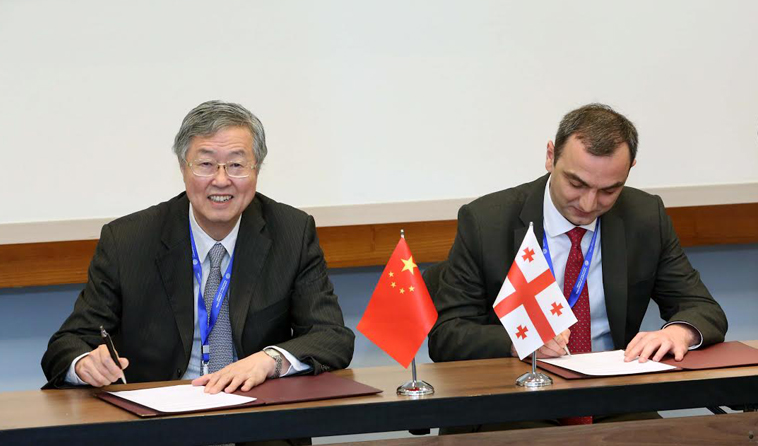
The National Bank of Georgia hosted the XXXIV Meeting of the Central Bank Governors' Club of the Central Asia, Black Sea Region and Balkan Countries
26 September, 2015
 On September 25-27, Tbilisi hosted the XXXIV Meeting of the Central Bank Governors' Club of the Central Asia, Black Sea Region and Balkan Countries, organized by the National Bank of Georgia (NBG). The Meeting tool place at the Radisson Hotel, and was led by Giorgi Kadagidze, Governor of the National Bank of Georgia.
On September 25-27, Tbilisi hosted the XXXIV Meeting of the Central Bank Governors' Club of the Central Asia, Black Sea Region and Balkan Countries, organized by the National Bank of Georgia (NBG). The Meeting tool place at the Radisson Hotel, and was led by Giorgi Kadagidze, Governor of the National Bank of Georgia.
Central Bank governors from 23 member countries of the Club – Israel, Czech Republic, Poland, Bulgaria, Turkey, China, Ukraine, Albania, Armenia, Azerbaijan, Belarus, Bosnia and Herzegovina, Croatia, Kazakhstan, Kyrgyzstan, Macedonia, Moldova, Montenegro, Russia, Serbia, Slovenia and Tajikistan – participated in the event.
Governors of the financial institutions discussed some of the most challenging questions for the region – foreign exchange rates and high levels of dollarization.
“First of all, I want to emphasize that kind of high-ranking meeting has been held in Georgia for the first time. The meeting participants are central banks governors from more than 20 countries, including China, Turkey, Ukraine, Czech Republic, etc. This yet again underlines the policies we have been implementing during this whole period and the credibility of National Bank of Georgia in this process. Of course the main subject of discussion is what happens in region and in whole world, namely the depreciation of the national currency. This is the theme of today’s meeting and countries share with each other their own experience, and most importantly what should be done and what can be the best way out from this situation.
And finally, the concurrence of the Central Bank Governors’ meeting with the 20’s anniversary of Lari was intentional. This is the first event within the scope of this jubilee. You might know that for this day a special coin has been minted, and we also have planned many surprises related directly to the pieces of currency and we will have interesting presentation on these projects in the coming weeks” said the governor of National Bank of Georgia, Giorgi Kadagidze.
Leonardo Leiderman from Tel Aviv University, who has been advising the National Bank of Georgia concerning the Larization process of the country’s financial system over the years, participated in the Governors’ Club Meeting as a special guest.
High levels of dollarization, along with other critical problems, constituted one of the central topics of discussion during the meeting. It is noteworthy that under the leadership of Leonardo Leiderman, professor at the Tel Aviv University, Israel implemented important reforms to counter the dollarization problem. Considering the current context, sharing his experience is of utmost importance for Georgia, as well as for the central banks that participated in the meeting.
 Within the scope of the meeting, for the purpose of fostering Georgian-Chinese economic relations, a Memorandum of Understanding was signed between the National Bank of Georgia and the People’s Bank of China. After signing the memorandum, the preparatory works towards bilateral currency swap agreements will commence and the National Bank of Georgia will gain access to the Chinese securities market. “This is the memorandum, after which we will begin working on the currency swap between Lari and Yuan. If the swap is successful, our businessmen and small entrepreneurs who have trade relations with China, will have the opportunity to get access to very interesting credit products” -said Giorgi Kadagidze.
Within the scope of the meeting, for the purpose of fostering Georgian-Chinese economic relations, a Memorandum of Understanding was signed between the National Bank of Georgia and the People’s Bank of China. After signing the memorandum, the preparatory works towards bilateral currency swap agreements will commence and the National Bank of Georgia will gain access to the Chinese securities market. “This is the memorandum, after which we will begin working on the currency swap between Lari and Yuan. If the swap is successful, our businessmen and small entrepreneurs who have trade relations with China, will have the opportunity to get access to very interesting credit products” -said Giorgi Kadagidze.
On September 27, the central bank governors traveled to Adjara and visited notable sights of Batumi.
The Central Bank Governors' Club of the Central Asia, Black Sea Region and Balkan Countries was established in 1998. The purpose of the Governors’ Club is to maintain financial stability in the region and foster cooperation within the banking sector. The foremost priorities of the organization are effective functioning of cash and currency markets, development of financial and economic cooperation, and encouragement of discussions on other matters of common interest for the member countries. The Club pays particular attention to supporting capital inflows in developing countries and the question of the development of national payment systems as well.
Other News